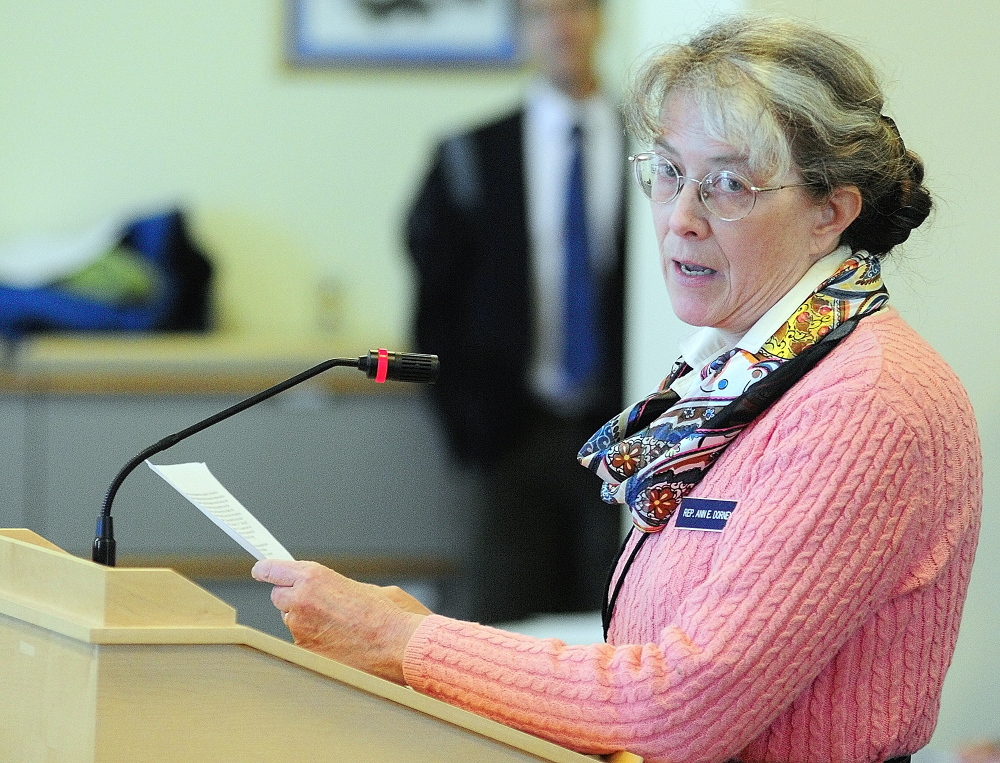NORRIDGEWOCK — A Norridgewock lawmaker was recognized recently for her work to pass a law that will allow police and emergency responders to carry and administer a drug that can be used to reverse symptoms of narcotic overdoses.
Rep. Ann Dorney, who was a co-sponsor on L.D. 1686, along with the bill’s sponsor, Sara Gideon, D-Freeport, received the Harm Reduction Hero award from the Maine Harm Reduction Alliance last week.
The Maine Harm Reduction Alliance is a program of the Down East AIDS Network in Ellsworth, a non-profit that supports those affected by HIV and seeks to inform the public on the spread of the virus.
The annual award is given to someone who makes a significant contribution to the health and well being of people with addiction issues or in reducing the harmful affects of addiction.
The law expands the authorization of who may carry and administer naloxone, a drug that is used to counter the effects of opioid overdoses. It is commonly known by the brand name Narcan.
Dorney, a physician who has practiced in Skowhegan for 32 years, works with narcotic addicts and says she has seen the effects of opioid overdoses first-hand.
“I had two patients with sons who died of opioid overdoses and have had to see them grieving. I’ve also had several patients who have come close to fatally overdosing, including one lady who was in a coma for three days after a narcotic overdose,” said Dorney.
Many people who die of narcotic overdoses actually have people with them when they overdose, but after calling 911 those people often leave because they are afraid to be arrested when police or emergency responders respond and the person who overdoses ends up dying, said Dorney.
“It was interesting to see how many legislators supported the bill this time because they had family members or knew people that had dealt with narcotic addictions,” Dorney said. “I think people have started to realize how big of a problem this is.”
Dorney was the lead sponsor of a similar bill that was vetoed by Gov. Paul LePage in 2013.
She wrote her first naloxone prescription to a family member of someone who is a heroin addict a few weeks ago, just after the bill went into effect on April 29.
Jayne Harper, health educator at MaineGeneral Medical Prevention Center said the need for naloxone distribution in Maine is on the rise. According to the most recent data from the Maine attorney general’s office, 163 drug induced deaths occurred in Maine in 2012. Twenty-eight people died from heroin overdoses, compared to just seven in 2011.
In March the hospital started a pilot program at the hospital’s Seton campus in Waterville and the MaineGeneral Rehabilitation Institute with offices in Waterville and Augusta to distribute naloxone kits to patients considered at-risk for an accidental overdose by the hospital’s psychiatry department.
“If somebody needs a kit they’re not in a position to use it on themselves,” Harper said. “I think there’s a hesitation around giving a prescription drug to somebody else, but it’s easier for the public, including providers, to follow through on this with the new law in place.”
The kits contain two doses of inter-nasal naloxone administered to patients by a nasal spray. The treatmetn only works on opioids, such as heroin, oxycodone, Percocet and Vicodin. Opioids can slow or stop a person’s breathing, but when the patient given the naloxone, receptors in the brain are blocked from absorbing the opiods and the effects can be reduced.
It’s still too soon to say how effective the new law is in Maine, but it is expected to reduce the number of drug-related deaths in the state said Kenney Miller, executive director and community health coordinator for the Down East Aids Network.
“We need to start doing some education around it, educating both town and county governments about their role in it as well as informing and educating health care providers that it can now be prescribed to family members of a person at risk,” he said.
A similar bill sponsored by Dorney last year was vetoed by LePage, who said in his veto message that making the drug more readily available would only encourage narcotic users to overdose, knowing that ill effects cold be overcome with naloxone. The bill included a provision that would given pharmacies the ability to dispense a naloxone kit if they follow a protocol from a doctor.
Rachel Ohm — 612-2368 | rohm@centralmaine.com
Send questions/comments to the editors.




Success. Please wait for the page to reload. If the page does not reload within 5 seconds, please refresh the page.
Enter your email and password to access comments.
Hi, to comment on stories you must . This profile is in addition to your subscription and website login.
Already have a commenting profile? .
Invalid username/password.
Please check your email to confirm and complete your registration.
Only subscribers are eligible to post comments. Please subscribe or login first for digital access. Here’s why.
Use the form below to reset your password. When you've submitted your account email, we will send an email with a reset code.